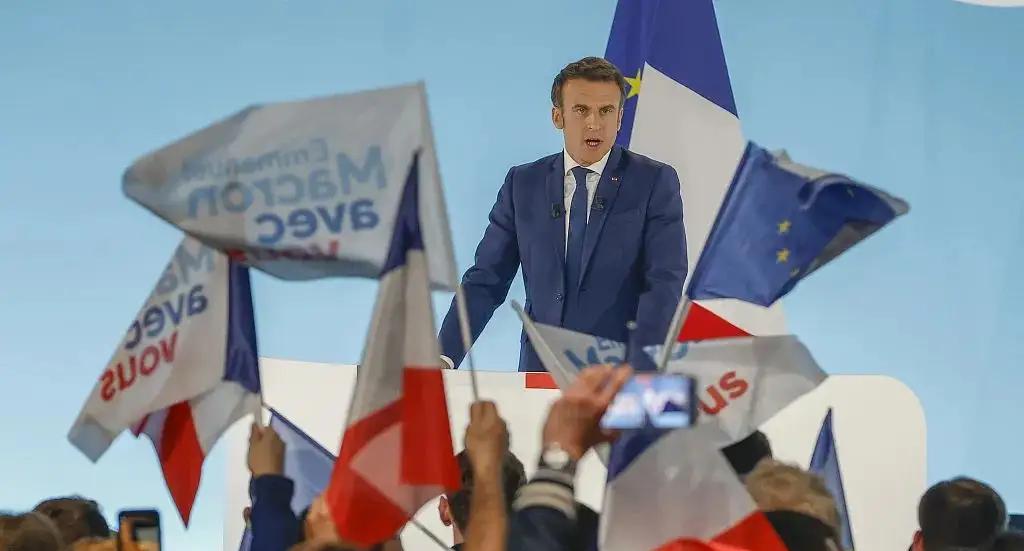On April 25, the French Interior Ministry announced the results of the second round of the presidential election, and Macron won a second term with 58.54% of the vote, a significant lead over Le Pen with 41.46% of the vote, and successfully re-elected.
On the evening of April 24, local time, Macron spoke in front of the Eiffel Tower. He acknowledged that many voters voted for him not to support his campaign platform, but to prevent the far-right Le Pen from being elected, which also meant that French society was mired in suspicion and division. Macron pointed out that he will be accountable to all voters and hopes to be the president of the whole people, not the president of one camp.

It is reported that before the second round of general election voting, Macron's support rate has reached 56.5%, and the outside world generally believes that he will have a thrilling victory. However, given the second round of voting or the widespread abstention, this also led to uncertainty in the election. French political scientist Morin commented that the reason why most people abstained was that they did not believe that the two candidates had the ability to change the economic status quo.
Shortly after Macron's victory, Le Pen also frankly admitted defeat, but she did not forget to emphasize that the election result was a "historic" victory, with more than 40% of the vote, giving the "National Union" the advantage in the parliamentary elections in June.
Some commentators said that compared with the 2017 French election, Macron's vote rate fell from 66% to 58%, and his governing direction and policies have aroused the suspicion of some people. On the contrary, Le Pen's series of far-right programs, including reforming the European Union, withdrawing from NATO's military integration institutions, hostility to the United States, and accepting Russia, have gained some support. The commentary further pointed out that far-rightism has gained unprecedented support, the contradictions and differences in French politics have been made public, and if the "National Alliance" makes a difference in the parliamentary elections in June, it will surely bring no small trouble to the United States, the European Union and NATO, and even cause European shocks.
But in any case, the West can breathe a sigh of relief for the time being. Later in the day, European Council President Michel, European Commission President von der Leyen and European Parliament Speaker Metzola posted separately in social media congratulating Macron on his re-election as French president.
Subsequently, US President Biden and US Secretary of State Blinken also issued articles of congratulations, saying that France is the oldest ally of the United States and an important partner in addressing global challenges, and the two countries will continue to carry out close and in-depth cooperation. In the early morning of April 25, Ukrainian President Zelenskiy wrote that Macron was "a true friend of Ukraine" and that the two countries would work together towards a strong and united Europe.
France, on the other hand, is not at peace. According to Agence France-Presse, the election results have just been released, including Paris, Marseille, Lyon and other places have erupted in demonstrations of different sizes. According to live video, they gathered in the streets, shouting slogans against Macron, and some radical people even clashed with the police, who had to respond with tear gas while blocking the road.
The New York Times published an editorial saying that the results of the French election highlighted the "division" of The French political situation, and Le Pen, as a far-right nationalist leader, had gained "unimaginable voices" or would evolve into the norm in European politics, and that neutral left- and neutral-right parties no longer had room to live. The commentary claims that even if Macron wins, he will face a restless and divided country.
Lhasa, director of the History Center at Sciences Po, also pointed out that this French election is quite "worse than rotten", and the voters who voted for Macron are not supporting his policies, but only disgusted with Le Pen. In the same way, the voters who voted for Le Pen were only opposed to Macron's re-election, and France lost its way in the choice between liberalism and populism.
It is conceivable that Macron's second term will face deeper contradictions and more dangerous situations, how this will bring about changes in European politics, and whether the far-right forces will fight back in the June parliamentary elections, all deserve our attention.